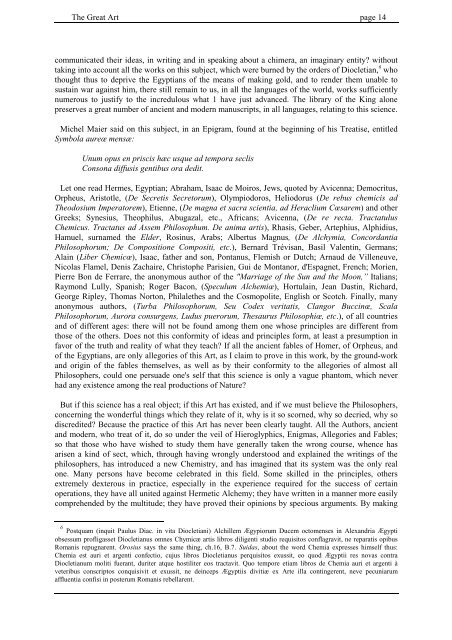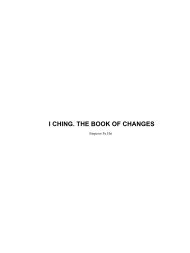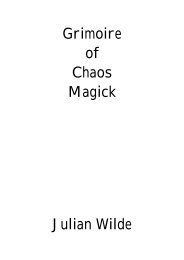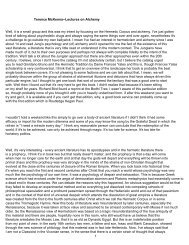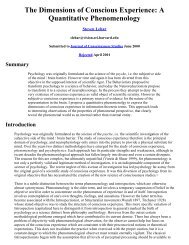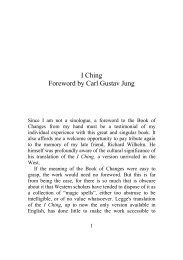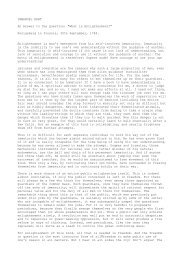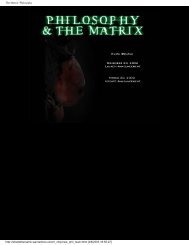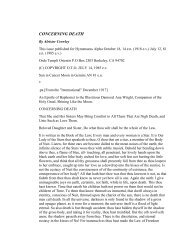Pernety - A Treatise On The Great Art.pdf - cyjack.com
Pernety - A Treatise On The Great Art.pdf - cyjack.com
Pernety - A Treatise On The Great Art.pdf - cyjack.com
You also want an ePaper? Increase the reach of your titles
YUMPU automatically turns print PDFs into web optimized ePapers that Google loves.
<strong>The</strong> <strong>Great</strong> <strong>Art</strong> page 14<strong>com</strong>municated their ideas, in writing and in speaking about a chimera, an imaginary entity? withouttaking into account all the works on this subject, which were burned by the orders of Diocletian, 6 whothought thus to deprive the Egyptians of the means of making gold, and to render them unable tosustain war against him, there still remain to us, in all the languages of the world, works sufficientlynumerous to justify to the incredulous what 1 have just advanced. <strong>The</strong> library of the King alonepreserves a great number of ancient and modern manuscripts, in all languages, relating to this science.Michel Maier said on this subject, in an Epigram, found at the beginning of his <strong>Treatise</strong>, entitledSymbola aureœ mensæ:Unum opus en priscis hæc usque ad tempora seclisConsona diffusis gentibus ora dedit.Let one read Hermes, Egyptian; Abraham, Isaac de Moiros, Jews, quoted by Avicenna; Democritus,Orpheus, Aristotle, (De Secretis Secretorum), Olympiodoros, HeIiodorus (De rebus chemicis ad<strong>The</strong>odosium Imperatorem), Etienne, (De magna et sacra scientia, ad Heraclium Cœsarem) and otherGreeks; Synesius, <strong>The</strong>ophilus, Abugazal, etc., Africans; Avicenna, (De re recta. TractatulusChemicus. Tractatus ad Assem Philosophum. De anima artis), Rhasis, Geber, <strong>Art</strong>ephius, Alphidius,Hamuel, surnamed the Elder, Rosinus, Arabs; Albertus Magnus, (De Alchymia, ConcordantiaPhilosophorum; De Compositione Compositi, etc.), Bernard Trévisan, Basil Valentin, Germans;Alain (Liber Chemicœ), Isaac, father and son, Pontanus, Flemish or Dutch; Arnaud de Villeneuve,Nicolas Flamel, Denis Zachaire, Christophe Parisien, Gui de Montanor, d'Espagnet, French; Morien,Pierre Bon de Ferrare, the anonymous author of the "Marriage of the Sun and the Moon,” Italians;Raymond Lully, Spanish; Roger Bacon, (Speculum Alchemiœ), Hortulain, Jean Dastin, Richard,George Ripley, Thomas Norton, Philalethes and the Cosmopolite, English or Scotch. Finally, manyanonymous authors, (Turba Philosophorum, Seu Codex veritatis, Clangor Buccinœ, ScalaPhilosophorum, Aurora consurgens, Ludus puerorum, <strong>The</strong>saurus Philosophiœ, etc.), of all countriesand of different ages: there will not be found among them one whose principles are different fromthose of the others. Does not this conformity of ideas and principles form, at least a presumption infavor of the truth and reality of what they teach? If all the ancient fables of Homer, of Orpheus, andof the Egyptians, are only allegories of this <strong>Art</strong>, as I claim to prove in this work, by the ground-workand origin of the fables themselves, as well as by their conformity to the allegories of almost allPhilosophers, could one persuade one's self that this science is only a vague phantom, which neverhad any existence among the real productions of Nature?But if this science has a real object; if this <strong>Art</strong> has existed, and if we must believe the Philosophers,concerning the wonderful things which they relate of it, why is it so scorned, why so decried, why sodiscredited? Because the practice of this <strong>Art</strong> has never been clearly taught. All the Authors, ancientand modern, who treat of it, do so under the veil of Hieroglyphics, Enigmas, Allegories and Fables;so that those who have wished to study them have generally taken the wrong course, whence hasarisen a kind of sect, which, through having wrongly understood and explained the writings of thephilosophers, has introduced a new Chemistry, and has imagined that its system was the only realone. Many persons have be<strong>com</strong>e celebrated in this field. Some skilled in the principles, othersextremely dexterous in practice, especially in the experience required for the success of certainoperations, they have all united against Hermetic Alchemy; they have written in a manner more easily<strong>com</strong>prehended by the multitude; they have proved their opinions by specious arguments. By making6 Postquam (inquit Paulus Diac. in vita Diocletiani) Alchillem Ægypiorum Ducem octomenses in Alexandria Ægyptiobsessum profligasset Diocletianus omnes Chymicæ artis libros diligenti studio requisitos conflagravit, ne reparatis opibusRomanis repugnarent. Orosius says the same thing, ch.16, B.7. Suidas, about the word Chemia expresses himself thus:Chemia est auri et argenti confectio, cujus libros Diocletianus perquisitos exussit, eo quod Ægyptii res novas contraDiocletianum moliti fuerant, duriter atque hostiliter eos tractavit. Quo tempore etiam libros de Chemia auri et argenti àveteribus conscriptos conquisivit et exussit, ne deinceps Ægyptiis divitiæ ex <strong>Art</strong>e illa contingerent, neve pecuniarumaffluentia confisi in posterum Romanis rebellarent.


